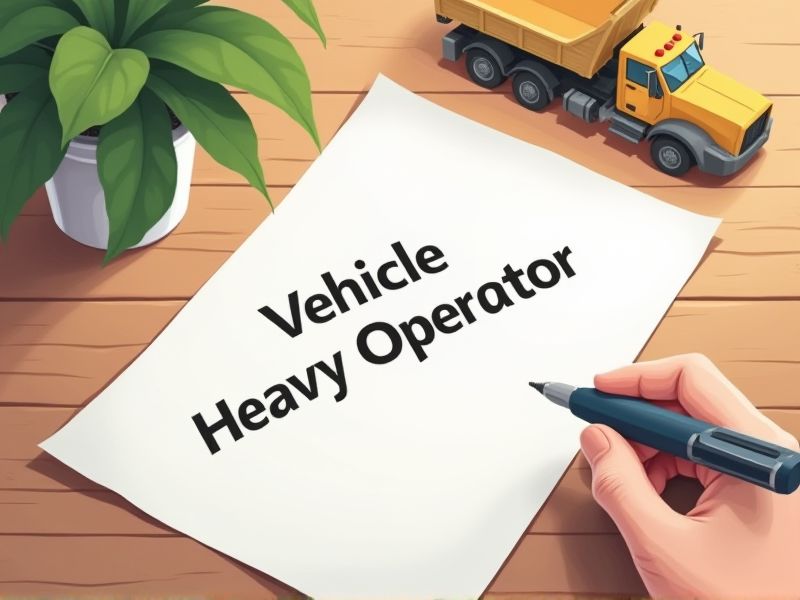
Operating heavy vehicles involves significant risks to both safety and the environment. Certification ensures that operators are adequately trained to handle demanding scenarios, reducing the likelihood of accidents and equipment damage. Regulatory bodies mandate these certifications to align operator skills with industry standards and legal requirements. Here are some essential certifications you may need as a Heavy Vehicle Operator.
Commercial Driver's License (CDL) Class A
A Commercial Driver's License (CDL) Class A is required because it certifies the ability to operate large vehicles, such as tractor-trailers or heavy trucks, which have a gross combination weight rating exceeding 26,001 pounds. The need for CDL Class A arises from federal and state regulations aimed at ensuring road safety by requiring specialized knowledge and skills for operating complex, heavy machinery. Obtaining this license involves passing rigorous tests, demonstrating a driver's understanding of safe truck operation, and adherence to traffic laws. CDL Class A qualifications facilitate the legal and safe transportation of goods over long distances, impacting logistics and supply chain efficiency.
Air Brake Certification Endorsement
Heavy vehicle operators need an Air Brake Certification Endorsement because air brake systems are complex and require specific knowledge for safe operation. Lack of proper training can lead to brake system failures, increasing the risk of accidents. Regulatory bodies often mandate this endorsement to ensure operators understand the mechanical and safety aspects of air brakes. Proper certification also enhances a driver's employability, as companies prefer hiring individuals with verified skills.
Hazardous Materials (HazMat) Endorsement
A HazMat endorsement is required for heavy vehicle operators because it ensures they have the necessary knowledge and skills to safely handle and transport hazardous materials. This endorsement reduces the risk of accidents and incidents involving dangerous substances, protecting public safety and the environment. The endorsement process involves stringent background checks and specialized training, ensuring that only qualified individuals handle hazardous shipments. Regulatory compliance with the endorsement is mandatory for transport companies to prevent legal repercussions and financial liabilities.
Tanker Endorsement
Tanker endorsement is required because it certifies a heavy vehicle operator's ability to safely handle the unique challenges of transporting liquids. Transporting liquid cargo often involves managing uneven weight distribution, which can affect vehicle stability and safety. Regulations mandate this endorsement to ensure that drivers possess the necessary skills and knowledge for handling potential hazards associated with shifting liquid cargo. This endorsement also helps reduce the risk of accidents and environmental damage in the event of a spill.
Double/Triple Trailers Endorsement
The double/triple trailers endorsement is required due to the unique maneuvering challenges posed by longer combinations of trailers. Enhanced stopping distance and potential for trailer sway necessitate specialized skills and understanding for safe operation. Regulatory standards mandate this endorsement to reduce the risk of accidents and maintain public safety. Insurance requirements and liability considerations also drive the need for specialized endorsements for operators handling such complex configurations.
Defensive Driving Certification
Heavy vehicle operators face increased risk of accidents due to their vehicles' size and reduced maneuverability, necessitating specialized knowledge to ensure public safety. Defensive Driving Certification equips operators with techniques to anticipate potential hazards on the road, thereby reducing accident rates. Regulations often mandate this certification as part of compliance to ensure operators meet industry safety standards. Employers value certified drivers, as it can lower insurance costs and improve overall operational efficiency.
Heavy Vehicle Maintenance and Inspection Certification
Heavy Vehicle Maintenance and Inspection Certification ensures that operators have the necessary knowledge to identify potential mechanical issues, reducing the risk of accidents on the road. Certification guarantees that operators are familiar with industry standards and regulations, promoting compliance with safety protocols. Trained and certified operators contribute to the extended lifespan of heavy vehicles through proper maintenance practices. Employers benefit from decreased downtime and repair costs as certified operators help maintain vehicle efficiency and reliability.
Occupational Health and Safety Certification
Accidents involving heavy vehicles often result in severe injuries or fatalities, necessitating rigorous safety protocols to protect operators and the public. Occupational Health and Safety Certification ensures operators are trained to identify and mitigate workplace hazards, reducing the likelihood of incidents. Insurance companies often require certified operators to minimize liability and ensure compliance with industry regulations, which lowers operational costs. Employers with certified heavy vehicle operators can experience enhanced productivity, as well-informed workers are more efficient and make fewer costly errors.
Driver Training and Safety Assessment Certification
Heavy vehicle operators often handle large, complex machinery, which poses significant risk if not managed properly, necessitating comprehensive training and certification to ensure safety. The certification process provides operators with crucial skills, enhancing their ability to respond effectively in high-pressure situations. Regulatory bodies frequently mandate such certifications to uphold industry-wide safety standards and minimize accident rates. Employers benefit from certified operators through reduced liability and insurance costs, while simultaneously maintaining a safer work environment.
Fatigue Management Training Certification
Fatigue impairs cognitive function and reaction times, increasing accident risk for heavy vehicle operators. Implementing fatigue management training ensures drivers recognize signs of tiredness, promoting proactive risk prevention. Certification programs provide structured frameworks, enhancing compliance with safety regulations. Organizations demonstrate commitment to safety, potentially reducing liability and insurance costs.
Summary
When you, as a Heavy Vehicle Operator, obtain certifications, potential career advancements become more accessible due to increased qualifications. Certified operators are often prioritized for job placements, reflecting trust in their skills and knowledge. Companies may offer higher salaries to certified operators, recognizing their expertise and commitment. Certified operators tend to have lower accident rates, enhancing safety and reducing operational costs for employers.
